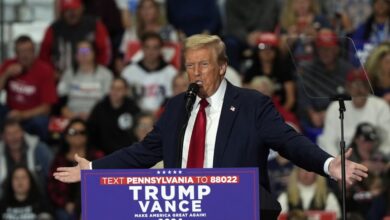Elections in Mozambique: Ruling party regarded front-runner – DW – 10/07/2024

Maputo, the capital of Mozambique, has been covered in red banners for weeks. Red is the color of FRELIMO, the “Liberation Front of Mozambique.”
Especially since August 24 — the day when the election campaign officially kicked off — the FRELIMO shade of red is seen everywhere.
The party has ruled the country uninterrupted since the African nation gained independence nearly 50 years ago, and it looks set to continue on that path.
The new kid on the block: Daniel Chapo
President Filipe Nyusi, who has led the country for 10 years, is not allowed to run again after completing two terms. FRELIMO had to find a fresh candidate: 47-year-old Daniel Chapo, the governor of Inhambane province for the past eight years.
The face of the former radio host and law lecturer is omnipresent on posters plastered on houses, walls, fences and huge outdoor billboards in Maputo, Beira, Nampula, Quelimane and other cities across Mozambique — almost as much as FRELIMO’s emblematic red banners and flags featuring a drum and a corn cob, which are the party’s symbols.
A fractured opposition
A total of 36 political parties have been allowed to run for the 250 parliamentary seats, alongside the ruling FRELIMO.
However, compared to FRELIMO’s campaign, the others are barely noticeable in everyday life: A few scattered posters on major avenues in the cities — that’s typically all there is to see of FRELIMO’s opponents.
It’s difficult to discern what they may or may not stand for: featuring the faces of the presidential candidates they support, those posters show little of the full spectrum of Mozambique’s political landscape, which is not to say that Chapo doesn’t have his opponents.
Among those competing for the top-job are opposition politicians Ossufo Momade from the largest opposition party, the “Mozambican National Resistance” (RENAMO), Lutero Simango from the “Democratic Movement of Mozambique” (MDM), and Venancio Mondlane, who is supported by smaller parties like the “Optimistic Party for Mozambique’s Development” (PODEMOS), which has no representative in parliament yet.
With a such a fairly small and fractured opposition, Daniel Chapo comes across as overly confident in his campaign — as if his victory is a foregone conclusion. This has, however, also earned him some criticism for coming across as arrogant and presumptuous:
In a statement he made at a campaign event in Niassa province a week before the elections, Chapo said that “absolutely everything” good in the country was owed solely to the accomplishments of FRELIMO.
“People go to the hospital, and forget that it was built by FRELIMO. They take medicine, and forget that it was imported by FRELIMO. And when they feel better, they say FRELIMO hasn’t done anything for our country. I call that ingratitude,” said the assertive candidate.
Opposing candidates with little motivation
Ossufo Momade, RENAMO’s candidate, is considered to be the most promising opposition candidate. In addition to RENAMO, eight smaller parties are also supporting his presidential bid.
However, Momade faces a tough battle: his campaign has failed to ignite much enthusiasm; there is disappointment with Momade within his own party. Internal critics claim he lacks ambition and seems content with merely being the opposition leader. In this campaign, Momade has been noticeably subdued and not particularly combative against Chapo.
In fact, many RENAMO members are reported to have distanced themselves from the Momade’s leadership and founded new parties, after he succeeded charismatic leader Afonso Dhlakama at the helm of the former rebel organization in 2018.
Lutero Simango, the candidate of the Democratic Movement of Mozambique (MDM), Mozambique’s third-largest parliamentary party, advocates primarily for reforms in the political system. But critical observers in Mozambique say that the MDM party also lacks the dynamism and enthusiasm needed for an electoral victory.
In his campaign, Simango has repeatedly said that “the country is not moving forward” because the constitution does not guarantee the independence of state institutions: “FRELIMO is dominant at all levels, while other parties are suppressed. Mozambique became independent in 1975, but we still have a state dominated by one party. We want to create a more inclusive, participatory, and democratic society,” he stressed during his campaign.
Venancio Mondlane is arguably the most controversial of the four presidential candidates in Mozambique. Critics label the former RENAMO spokesperson as an unpredictable populist, who is also supported by extra-parliamentary parties “Optimistic People for Mozambique’s Development” (Podemos) and “Democratic Revolution” (RD).
Young people in the major cities, in particular, see him as a beacon of hope.
Mondlane left RENAMO in June 2024 and resigned from his parliamentary seat. Shortly after, he announced the formation of his own party — the “Democratic Alliance Coalition” — as well as his candidacy for president for the October 9, 2024, elections.
However, his new party was excluded from the parliamentary elections by the National Election Commission (CNE), allegedly due to procedural errors, which Mondlane has labeled as “not fair.”
“We will fight, and we will not bow to the established power structures,” Mondlane told DW in a recent interview.
Election commission is ‘well prepared’
Shortly before the election, the spokesperson of the National Election Commission (CNE), Paulo Cuinica, acknowledged in an interview that there had been some issues in the run-up to the elections, especially with delays in disbursing state campaign funds to smaller parties. However, overall, everything has been going according to plan, he reassured DW.
“There is no doubt that we are prepared to organize and conduct the elections on October 9, both domestically and for the diaspora. There are no significant logistical problems,” Cuinica said.
According to the CNE, more than 17 million Mozambicans are registered to vote, including nearly 334,000 living abroad. But with so much fragmentation among opposition candidates, it is widely expected that ruling party candidate Daniel Chapo will indeed replace Filipe Nyusi as the next president of the southeastern African country.
Edited by: Sertan Sanderson




